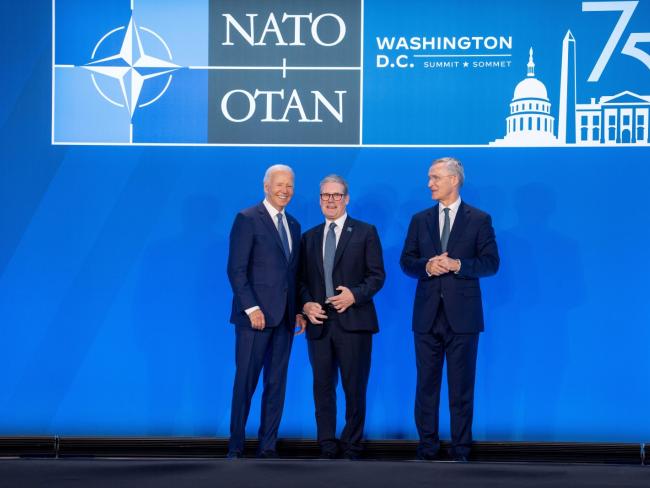11 July 2024

Talking aggression: Keir Starmer with NATO secretary general Jens Stoltenberg and US President Joe Biden at the NATO summit, Washington, 10 July 2024. Photo Javad Parsa / NTB / Alamy Stock Photo.
Within days of taking office, the new government is talking the same story as the old one on NATO and war. That’s little surprise given their record in opposition.
Keir Starmer and his new minsters were soon abroad to broadcast their message. The only change from their predecessors is to increase commitment to NATO and Ukraine. This includes agreement for Ukraine to fire British weapons at targets in Russia, a significant escalation.
Commitment
When in opposition, the new secretary of state for defence John Healey repeatedly endorsed the Conservative government’s support for Ukraine. He committed to continue this policy in any future Labour government.
In May, Healey visited Kyiv along with David Lammy, now foreign secretary. They stated, “The next Labour government's commitment to Ukraine will be ironclad, and European security will be our first foreign and defence priority.”
Healey said that he wants to raise Britain’s military spending to 2.5 per cent of UK GDP by 2030 – that would be around £57 billion based on current GDP, and could be much higher depending on GDP growth.
Pact
Healey wants larger armed forces, closer co-operation and leadership with NATO, a 100-year military cooperation partnership between Ukraine and the UK, and a “comprehensive UK-Germany defence and security pact”.
“Our resolve to confront Russian aggression is absolute.”
Healey visited Ukraine within 48 hours of being appointed defence secretary – a signal from the government about its commitment to NATO and to war. Healey at once directed officials to ensure that weapons pledged in April by the previous government, should be delivered in full within the next 100 days.
He said, “As the new defence secretary, I will ensure that we reinvigorate Britain’s support by stepping up supplies of vital military aid. Our commitment to stand with the Ukrainian people is absolute, as is our resolve to confront Russian aggression and pursue Putin for his war crimes.”
Blocking
Insistence on indicting President Putin is designed to block any moves towards the much-needed ceasefire and negotiations to end the war. The previous Conservative governments took the same stance.
And a few days later, the new prime minister was repeating the same line at the NATO summit in Washington. Before his trip, Starmer announced a review into Britain’s military capability and called for an increase in military spending by all NATO members.
“Irreversible”
Badged as defence, this policy is about aggression – pushing for an “irreversible” path for Ukraine to join NATO and for closer ties to the EU with a new security pact.
The commitment to increase defence spending may not be firm, and is what the Sunak government promised. And the defence review could end up as window dressing. But the government’s aims are what matters right now, and they are clear.
